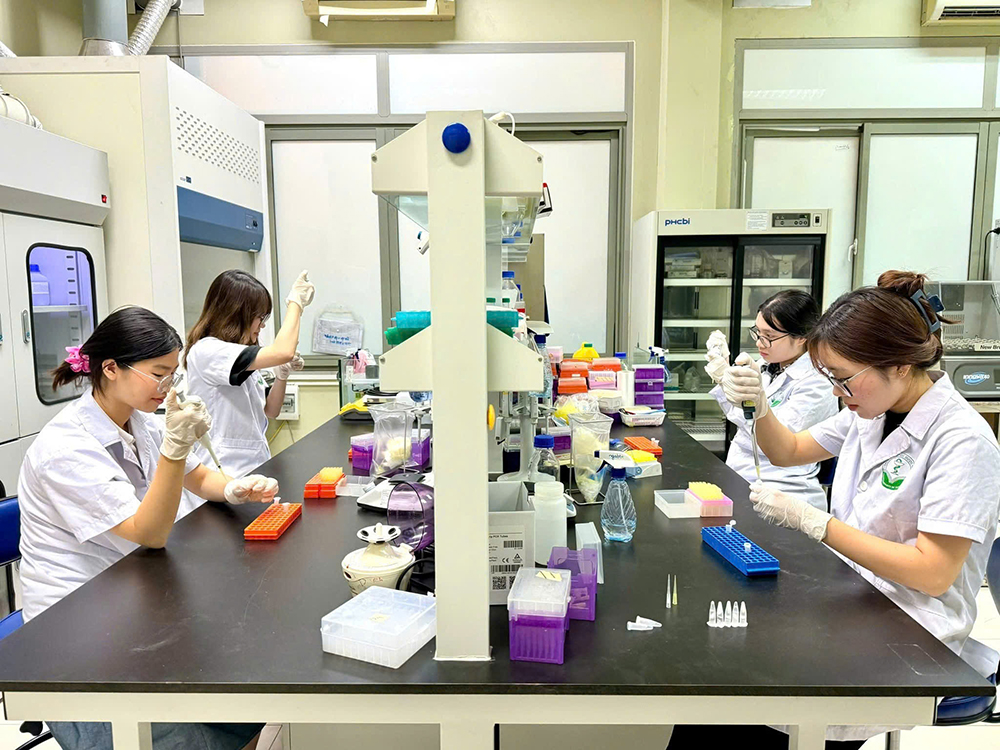Vietnam currently has over 50 universities offering biotechnology programs. This year, universities are using a variety of subject combinations for admissions, typically including math and biology. Some universities also use other combinations, such as A00 (math, physics, chemistry), D07 (math, chemistry, English) at Hanoi National University of Science; X08 (math, physics, technology), D01 (math, literature, English), C03 (math, literature, history), X13 (math, biology, economic and legal education) at Vietnam National University of Agriculture.
Biotechnology programs at these universities require approximately 133-157 credits. In addition to general and foundational knowledge, each university has its own specialized training focus.
Associate Professor Pham The Hai, head of the biology department at Hanoi National University of Science, said the university provides students with in-depth training in biology-based technologies, with a core knowledge base in molecular and cell biology, genetics, microbiology, biochemistry, and animal and plant biotechnology.
Students can specialize in various fields, including microbiology, cell and embryo technology, protein-enzyme and genetic engineering; agricultural, industrial, pharmaceutical, and bioinformatics biotechnology.
Students also have access to new technologies like gene editing, 3D cell printing, organoids, and synthetic biology, based on their interests, strengths, and market demands.
 |
Biotechnology students at Hanoi University of Pharmacy in the laboratory. Photo courtesy of the university |
Biotechnology students at Hanoi University of Pharmacy in the laboratory. Photo courtesy of the university
At Vietnam National University of Agriculture, the program provides knowledge and skills in biotechnology for applied research and technology transfer. Specialized courses cover various subjects, such as applied bioinformatics, animal cell technology, plant tissue culture technology, genetic engineering, principles and applications.
Meanwhile, at Hanoi University of Pharmacy, according to Associate Professor Phung Thanh Huong, head of the biotechnology department, the program provides additional knowledge related to health, diseases, and medicine. Students learn about rapidly developing fields such as pharmacogenomics for personalized treatment, biopharmaceutical research and development, and vaccine production technology.
"This is a unique aspect of our training program compared to other universities," Huong said.
The universities also focus on equipping students with soft skills to enhance their competitiveness in the job market, such as critical thinking, presentation skills, and teamwork. Students also gain practical experience through internships at research institutions or businesses.
Career opportunities
Biotechnology graduates can work in fields such as:
: medicine and pharmaceuticals (diagnostic testing, drug formulation, vaccines);
: agriculture, forestry, and fisheries (plant and animal breeding, production of biological products, biotechnology for improving product quality and yield);
: industry (fermentation technology, biomaterials, pharmaceuticals, processing);
: food (food processing and preservation, post-harvest technologies);
: environment (environmental treatment, product toxicity assessment, waste treatment);
: establishing and managing production facilities, businesses, consulting services in the field of biotechnology.
According to the universities, 5 to 10 years ago, some graduates struggled to find jobs. However, opportunities are now more abundant, especially after the Covid-19 pandemic, highlighting the role of biotechnology in addressing global health issues.
Biotechnology salary expectations
According to Hai, salaries for new graduates vary depending on the nature of the job. In government agencies, salaries are based on the standard pay scale and allowances for public employees.
"In private companies, depending on the position, biotechnology graduates can expect a starting salary of 8 to 15 million VND," he said.
Huong provided similar figures for graduates working in biopharmaceutical research and development, diagnostic kit development, testing laboratories, and quality assurance departments at pharmaceutical companies.
This amount gradually increases based on individual contributions and experience, reaching 50 to 100 million VND per month at some companies with favorable compensation packages.
"Those with strong English proficiency, professional knowledge, and skills working in competitive international environments that require dynamism and creativity can earn even higher incomes," Huong said.
Binh Minh - Duong Tam












